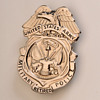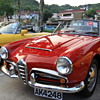Posted 11 years ago
 Chrisnp
Chrisnp
(310 items)
The 1895 Nagant revolver was the military issue handgun for Imperial Russia through WWI and later the Soviet Union until 1930, when it was replaced by the Torkarev semi-automatic, although production didn’t stop until 1945.
The weapon was designed by Belgian Leon Nagant, brother of Emile Nagant of Mosin-Nagant rifle fame (see earlier posting). It is a seven shot revolver chambered for the very unusual 7.62 Nagant cartridge – unusual because the case completely surrounds the bullet. In other revolvers, a certain amount of energy escapes through the gap between the cylinder and the barrel. In the Nagant, when the hammer is cocked, the cylinder is pushed forward over the barrel and the mouth of the case pushes into the barrel and creates a gas seal. This adds about 200-300 feet per second to the bullet’s velocity. In my opinion, that’s over-engineering. On the other hand, Russia’s intelligence and security services kept the revolver in inventory for decades longer because the gas seal also meant it could be used effectively with a silencer.
The side plate on my revolver indicates it was made at the Imperial Ordinance Factory at Tula in 1911. It’s the single action version (hammer must be cocked back before pulling the trigger) that was issued to enlisted men. Officers got a double action version (just pull the trigger). After 1922 the Soviets stopped that nonsense and all Nagant pistols were made double action. My revolver also sports the early finely checkered walnut grips and rounded front sight. What is missing is the lanyard ring, which appears to have been snapped off clean with the butt of the pistol.
The holster came out of Mongolia a few years back, and is unmarked and of unknown age and provenance, but the pattern is the same as the 1935 model Nagant holsters. The suspension straps instead of belt loops made the rig more comfortable and accessible to seated troops. Unfortunately the flap stud is missing. The cleaning rod is from a post-WWII rig that I will show separately.
Ammo: Original Nagant ammo used a 108 grain full metal jacketed round nose bullet with a muzzle velocity of 935 feet per second. Fiocchi of Italy still makes this ammo, but it can be a bit pricy. I bought a bunch and re-load the brass (Others use .32-20 brass, but that won’t be long enough for the gas seal). Lee sells the reloading dies, but the seating die has to be modified to seat at the right depth when using the longer Fiocchi brass. I used a 115 grain cast flat nose bullet with 3 grains of Hercules Bullseye and 6 grains of cornmeal filler to obtain a velocity of 890 fps. Shooting at 25 yards with the standard slow pistol target grouped at 6 o’clock between the X and 8 rings.
WARNING: Load data is provided for information only. Many vintage firearms are unsafe to shoot and I do not advise use of this load data for other firearms since I do not know the specific firearm that may be involved or its condition.


















I have also updated the information and pictures for my "Japanese T-26 Revolver" and "Italian Model 1889 Ordinance Revolver" postings I did a long time ago.
Hey, Chris! I caught up with work & waiting on parts. Yeah, I missed it. Probably in the scrolling-blur. CW has gotten so many FNG's that I have trouble keeping up! Maybe doesn't have much bluing left but looks in good shooting condition. Must have a good bore & steady hand to get that close of a group. The Ruskies have always liked smaller calibers & the world is finally catching up.
You say you are using Bullseye & a filler. That load is about what I used in 9m/m with about a 124 gr. bullet. The Ruskies must have used a larger grain nito-cellulose. So the cases stick out the front of the cyl. a bit? Would be a good design for silencers. (Sorry, I guess we are supposed to say "suppressor" now days.). I have had friends ask about making silencers(sorry) for their revolvers & just tell them to forget it. Once explained, some of them do actually understand that it doesn't work like in the movies. Nice piece, mon.
Blunderbuss I hear you about the FNGs. Also what I call drive by posters. Post one item aks what it is worth and are never heard from again.
Anyway interesting pistol. The round looks a bit like the M1 carbine's but I suspect it is a bit shorter. I have a feeling the danger with this pistol is you may hit them and attract their attention.
Fort, "Drive by posters" is a good description.
Sorry for the late reply, but my modem stopped working. My service provider said it was "nearing the end of it's service life" I sometimes wish that described my service provider.
Blunder, those groups were made from a machine rest - I decline to comment on the steadiness of my gun hand :)
Fortapache, the rounds look long like the .30 carbine because the case extends past the bullet. The diameter is comparable to the .30 carbine, but capacity is much less.
Thanks for the love blunder, tom61375, racer4four, undreal, southcop, fortapache, Manikin and geo26e.
Still want to know if the case extends a bit past the cyl. to form that gas seal? I see that the bullet is seated even or below the lip. Does the cyl. move back enough to allow this?
The lip of the case is flush with the outer front face of the cylinder, with the bullet completely inside the case. The cylinder rotates like a regular revolver, but when the hammer is cocked, the cylinder is pushed forward and the cone at the back of the barrel fits into a recess on the front face of the cylinder. at that point the lip of the case is actually inside the cone of the barrel. I've tried to show how the cylinder and barrel mate together in photo 3.
J'comprende. Really couldn't tell by pic #3. Now I see the principle & mechanics.
Thanks for the love petey and fillup1